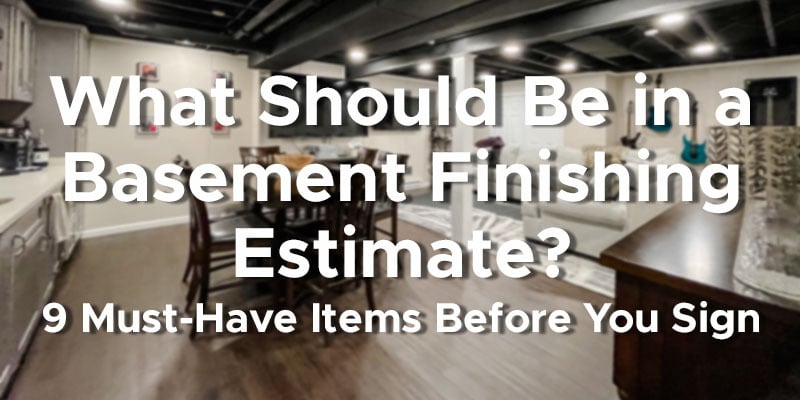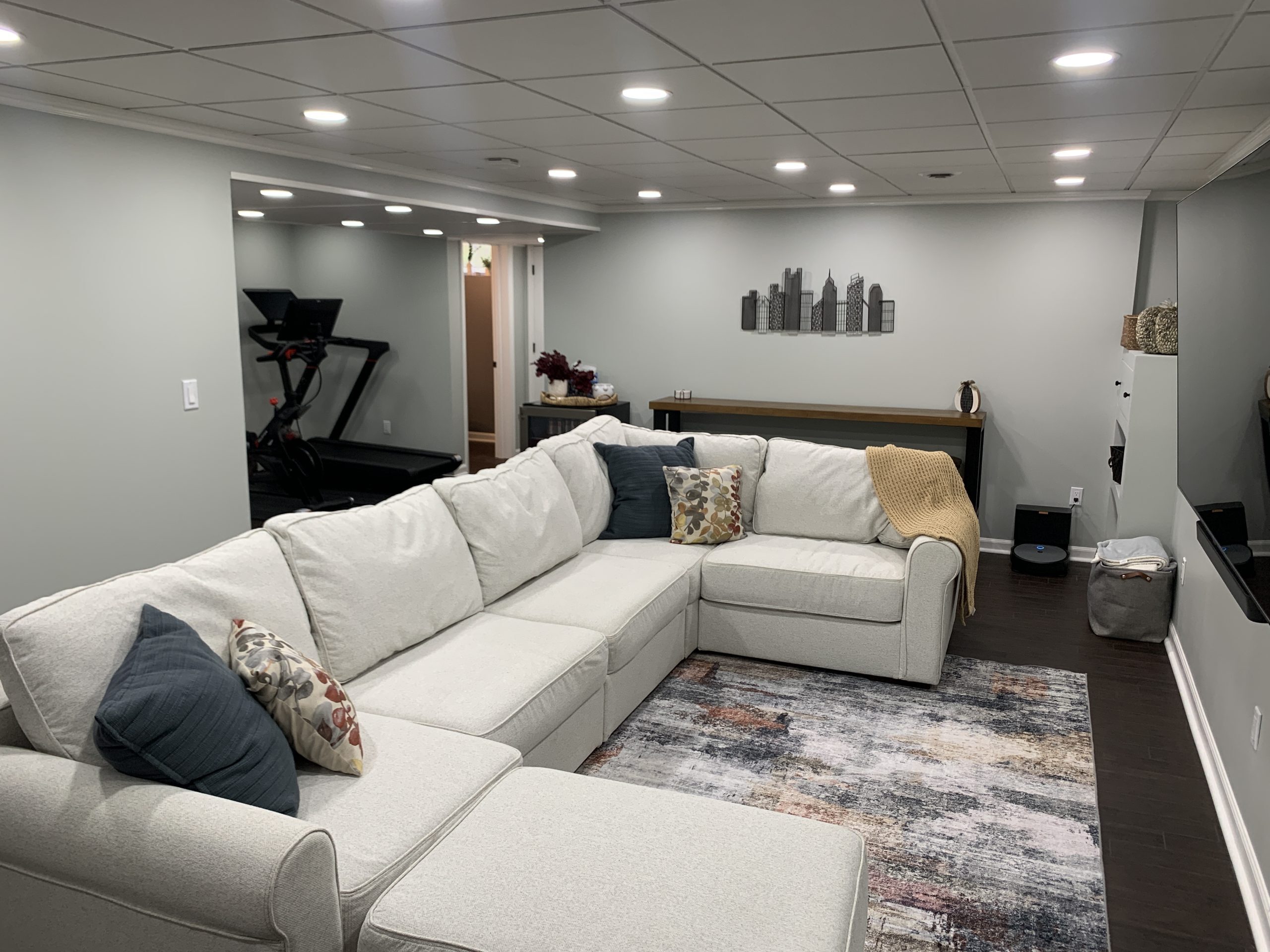How Much Does It Cost to Finish a Basement in Pittsburgh? (2026 Cost Guide)
June 16th, 2025
7 min read

Originally Published: 6/16/2025 Updated on: 1/30/2026
Is your basement an underused space that feels more like a cold storage zone than part of your home?
Wondering what it would actually cost (and what’s really involved) to turn it into a warm, livable space your family can enjoy?
In this article, we’ll break down the real 2026 costs of finishing a basement in the Pittsburgh area using our Total Basement Finishing system, built specifically for conditions typically found in Western Pennsylvania basements.
You’ll learn what’s included, how much to budget based on your square footage, hidden costs to watch for, and how to avoid common renovation headaches so you can move forward with clarity and confidence.
In the Pittsburgh area, finishing a basement with Total Basement Finishing typically costs between $45,000 and $150,000, depending on size, layout, moisture conditions, and materials used. Most homeowners can expect to pay $130–$200 per square foot for a professionally finished basement designed for Western Pennsylvania’s climate.
Is Finishing Your Basement Worth It for Pittsburgh Homeowners?
Finishing your basement adds livable square footage without the cost or disruption of a home addition, making it one of the most flexible and value-driven home upgrades for Pittsburgh homeowners.
In 2026, with higher moving costs, limited housing inventory, and interest rates still fluctuating, many Pittsburgh homeowners are choosing to improve the space they already have instead of relocating.
Some popular uses include:
| Common Use | Why Homeowners Choose It |
|---|---|
| Home office | Quiet, private workspace away from main living areas |
| Playroom / teen space | Keeps toys and noise contained |
| Media room | Ideal for sound control and dim lighting |
| Guest room / in-law suite | Adds flexibility for visitors or family |
| Home gym | No commute, year-round comfort |
| Bar or hobby space | Great for entertaining or personal projects |
During Pittsburgh’s long winters, having a cozy basement to spread out in can make a huge difference. It’s a smart way to enjoy more of your home, now and in the future. Of course, not all basement finishes are created equal. Here's what sets our system apart from traditional basement remodeling.

What Is the Total Basement Finishing System and Why It Works Better in Pittsburgh Basements
At Energy Swing, we use a special system made just for basements using inorganic materials. It’s called the Total Basement Finishing (TBF) system. It handles the cold, damp, and ever-changing conditions that basements often have without the worry of moisture damage like mold and mildew.
| Feature | Total Basement Finishing | Traditional Basement Remodel |
|---|---|---|
| Wall materials | Inorganic, moisture-resistant panels | Drywall and wood studs |
| Mold resistance | Designed to resist mold and mildew | Vulnerable in damp environments |
| Durability | Built for below-grade conditions | Designed for above-grade spaces |
| Maintenance | Easy to repair or replace panels | Repairs often require demolition |
| Long-term performance | Consistent comfort over time | Higher risk of moisture damage |
What’s Included in Energy Swing’s Basement Finishing System
Every Total Basement Finishing project includes moisture-resistant materials designed specifically for basement environments, not standard above-grade construction products.
Here's what's included in every TBF project by Energy Swing:
| Category | What’s Included |
|---|---|
| Walls | EverLast™ insulated wall panels |
| Flooring | ThermalDry® Elite (wood-look, tile, or carpet) |
| Framing | Steel framing (no wood) |
| Trim | PVC baseboards, door trim, and moldings |
| Ceiling | Mold-resistant drop ceiling tiles |
| Lighting | LED recessed lighting |
| Electrical & plumbing | Included as needed for layout |
Together, these components create a basement that’s warmer, quieter, and easier to maintain than traditional finishes.
Not sure which basement system is right for you? Check out our side-by-side comparison of Total Basement Finishing vs. traditional basement finishing to see the key differences in durability, cost, and long-term value.
Now that you know what goes into the system, let’s talk about the numbers. Here’s what a finished basement typically costs in the Pittsburgh area.
Basement Finishing Costs in Pittsburgh: Typical Price Ranges by Square Foot
Let’s talk numbers. Looking at it by size, expect to pay: $130 to $200 per square foot
While every project is unique, here’s a look at Energy Swing’s average price ranges based on square footage.
Most Pittsburgh homeowners spend between $50,000–$90,000 to finish a standard-sized basement using a moisture-resistant system.
| Size of Basement (sq ft) | Estimated Cost | Monthly Payment (12-Year Plan) |
|---|---|---|
| 300 – 400 sq ft | $43,750 – $50,500 | $498-$575 |
| 400 – 500 sq ft | $50,500 – $63,000 | $575-$717 |
| 500 – 600 sq ft | $63,000 – $75,000 | $717-$854 |
| 600 – 700 sq ft | $75,000 – $87,400 | $854-$995 |
| 700 – 800 sq ft | $87,400 – $99,500 | $995-$1,132 |
| 800 – 900 sq ft | $93,500 – $106,000 | $1,064 – $1,206 |
| 900+ sq ft | $99,500 – $112,300 | $1,132-$1,278 |
Note: Monthly payment ranges may vary based on your approved rate.
*Monthly payment ranges vary based on credit tier and lender terms.
As labor costs, material pricing, and permit requirements continue to evolve in 2026, these ranges reflect typical projects, but exact pricing will depend on your home’s condition and layout. These price ranges include materials, labor, electrical, lighting, and Energy Swing’s basement-specific finishing system.
Not sure how big your basement is? Read our quick guide on how to measure your basement’s square footage so you can estimate your project cost with confidence.
What Factors Affect the Cost of Finishing a Basement in Pittsburgh?
No two basements are the same. Several variables can influence your final cost, some more than others. Here’s what can change the price: The Size and Layout
- How much of the basement are you finishing?
- Is it one big open room or several smaller rooms?
- Are bathrooms or bars part of the plan?
Existing Conditions
- Is the basement dry, or are there water issues?(Waterproofing a Pittsburgh-area basement can cost $5,000 to $20,000+, depending on drainage needs and foundation type.)
- Does the floor need leveling? (average cost to level a concrete floor costs between $1,260- $8,100)
- Is the electrical panel up to date?
- Are there cracks or foundation concerns?

Materials and Upgrades
-
Traditional drywall vs. moisture-resistant panels
-
Trim type (PVC vs. wood)
-
Drop ceilings vs. drywall ceilings
-
(Drywall is typically less expensive at $1.50-$3 per square foot while a drop ceiling is $2-$5 per square foot. Drop ceilings have the added bonus of easy access to wires and plumbing with easy repair.)
-
-
Flooring: carpet, vinyl plank, or tile
Beyond the obvious costs, there are some common surprises that can affect your budget. These are the things to plan for ahead of time.
Hidden Basement Finishing Costs Pittsburgh Homeowners Should Plan For
Some costs may not be obvious until after the project is started. Here are a few things that can increase cost unexpectedly:
- Waterproofing needs (like sump pumps or French drains)
- Leveling uneven floors (especially in older Pittsburgh homes)
- Electrical upgrades (subpanels or full service updates)
- Foundation concerns (bowed walls, hollow floors)
- Permit delays—the cost is small, but waiting can affect your timeline
- Change orders—adding a bathroom, extra lighting, or custom finishes mid-project
A contractor experienced with Pittsburgh basements can often identify these issues before construction begins, saving time, money, and frustration.
Now, let’s explore financing options that can make your project more manageable.
Basement Financing Options for Pittsburgh Homeowners
In 2026, many homeowners are prioritizing flexible financing options that allow them to move forward without tapping home equity or delaying projects indefinitely.
Here are a few common ways to pay:
| Financing Type | Key Features |
|---|---|
| Contractor Financing | Fast approval, no appraisal, no home equity needed, unsecured loan |
| Home Equity Loan | Lower interest rates, but longer approval time and closing costs |
| Personal Loan | Flexible use, but typically higher interest rates |
Example Monthly Payments for a $50,000 Project (12-Year Term)
| Interest Rate | Monthly Payment with 10% ($5K) Down |
|---|---|
| 8.99% | ~$530 |
| 11.99% | ~$615 |
| 15.99% | ~$725 |
Energy Swing partners with Regions for flexible basement project financing. Rates are accurate as of May 2025.
DIY vs. Professional Basement Finishing: Costs, Risks, and Long-Term Value
At first glance, Do-It-Yourself (DIY) can appear cheaper. But here’s what DIY really means:
- Time-consuming: evenings and weekends for months
- High risk: safety issues, code violations, long-term maintenance problems
- Stressful: dealing with permits, materials, and surprise problems
- Low resale value if the work isn’t done professionally or up to code
Below is a comment taken from the Reddit thread r/DIY where the original poster asks if it’s too big of a project for a “weekend warrior” which means a person who only plans to work on it during their weekends. Below the bolded title is a person's honest response on their experience doing it themselves.
If you value your time, want peace of mind, and care about long-term home value, hiring a pro is worth it.
Whether you hire a pro or go it alone, one big question remains: Will a finished basement actually increase your home’s value?
How to Choose the Right Basement Finishing Contractor in Pittsburgh
Basement finishing needs a different skill set than other interior remodeling work. Look for:
- Experience with basement-specific projects
- In-house installation crews (not all subcontractors)
- Detailed planning with construction blueprints
- Real product warranties
- Proper insurance and licensing
- Local reputation and reviews
- Transparent info on who will be in your home
Pro tip: If they can't explain their moisture strategy, or who’s doing the work, it’s worth asking more questions before you commit.
Once you find the right contractor, the next step is getting a clear and complete quote. Here’s how to make sure nothing gets missed.
How to Get an Accurate Basement Finishing Quote (and Avoid Surprise Costs)
The best quotes come from contractors who take the time to:
- Inspect electrical panels, flooring, ceiling height, and plumbing
- Ask how you want to use the space—not just what you want it to look like
- Review potential issues before they become change orders
- Share past projects and walk you through options step-by-step
Avoid vague ballpark numbers. A detailed quote upfront helps prevent budget surprises later.
Now that you know the costs, the materials, and the risks—it’s time to take the guesswork out of your own project. Here’s where to start:
Ready to See What It Would Cost to Finish Your Basement?
You’ve probably walked past your unfinished basement for years—wondering what it could be, but not knowing where to start. You’re not alone. The uncertainty around cost, materials, and the construction process stops many Pittsburgh homeowners from making the most of this valuable space.
Now, you have real clarity. You understand what drives the cost of basement finishing, what’s included in Energy Swing’s Total Basement Finishing system, and how to avoid surprise expenses that derail your budget.
So what’s the easiest next step? Use our Basement Pricing Calculator to get a personalized estimate based on your square footage and layout. It’s fast, simple, and the smartest way to take the guesswork out of planning.
At Energy Swing, we’ve helped hundreds of Pittsburgh homeowners turn their basements into cozy, long-lasting spaces designed for the way they really live. If you're ready to explore what's possible in your home, we're here to help you take the first step— with clarity, confidence, and a system that works.
Total Basement Finishing FAQ
How much does it cost to finish a basement in Pittsburgh?
In the Pittsburgh area, most basement finishing projects range from $50,000 to $90,000, depending on square footage, layout, moisture conditions, and material choices. On average, homeowners can expect to pay $130–$200 per square foot for a professionally finished basement designed for Western Pennsylvania’s climate.
How long does it take to finish a basement?
Most basement finishing projects take 4–8 weeks once construction begins. Timelines can vary based on basement size, layout complexity, permitting, and whether additional work—like waterproofing or electrical upgrades—is needed.
Can you finish a basement that has moisture or water issues?
Yes—but moisture issues should be addressed before finishing the space. Many Pittsburgh basements require waterproofing solutions like sump pumps, drainage systems, or wall treatments before finishing can begin. Using basement-specific materials helps reduce long-term moisture damage.
Does a finished basement increase home value?
A professionally finished basement can increase your home’s usable living space and overall appeal, which may positively impact resale value. While the return varies, finished basements are often attractive to buyers looking for flexible spaces like home offices, guest rooms, or entertainment areas.
What’s the difference between Total Basement Finishing and traditional basement remodeling?
Traditional basement remodeling typically uses drywall and wood framing, which can be vulnerable to moisture and mold. Total Basement Finishing systems use inorganic, moisture-resistant materials designed specifically for below-grade environments, making them more durable and better suited for Pittsburgh basements.
Zach Fontecchio is a Client Consultant at Energy Swing who specializes in Basement Finishing. Having work with homeowners across the Pittsburgh area, he understands how to find the right basement finishing solutions based on homeowner needs.
Topics:

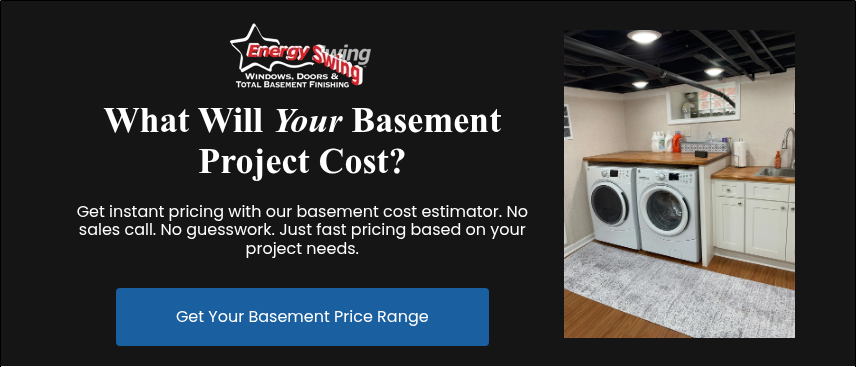
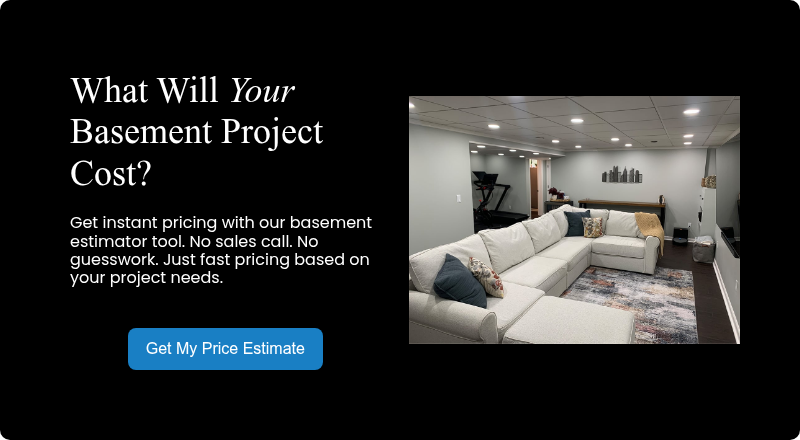





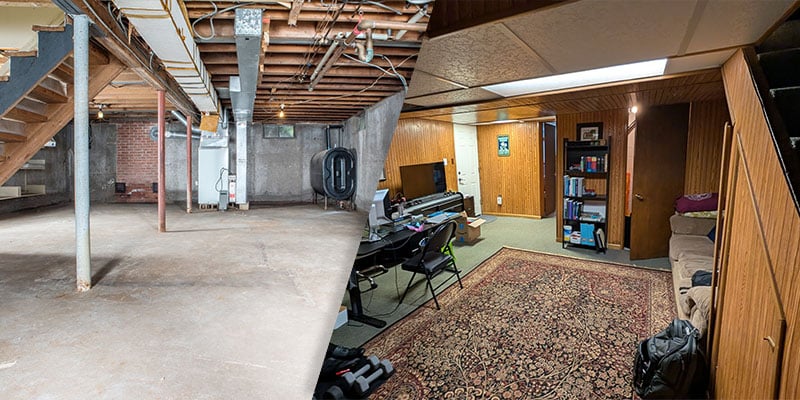
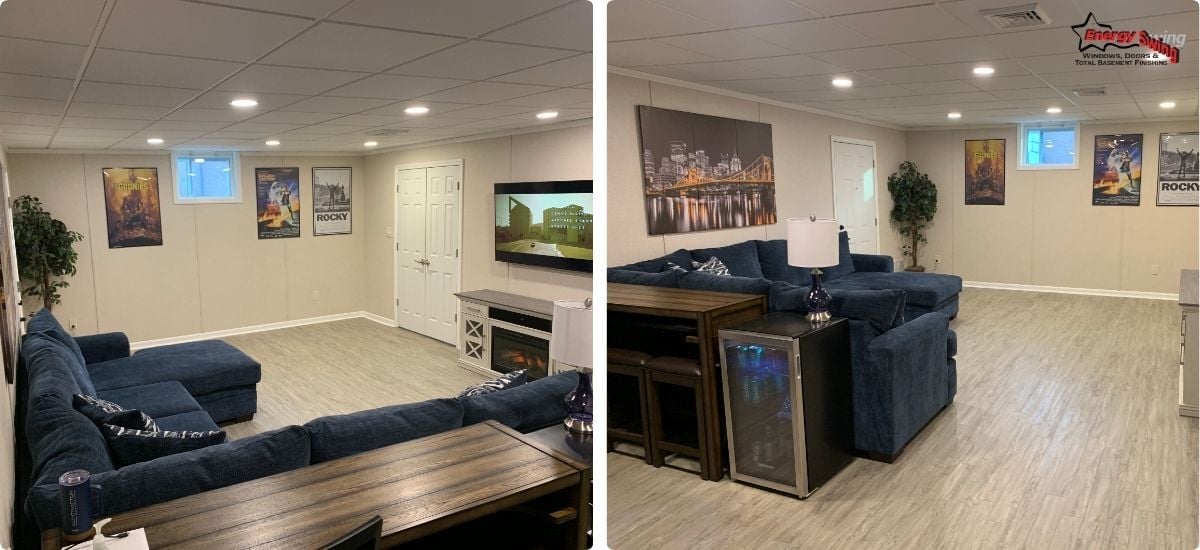
.jpg?width=1200&height=550&name=Copy%20of%20Copy%20of%20ESW%20Collage%20Template%20(3).jpg)
